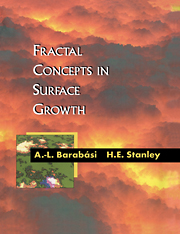Book contents
- Frontmatter
- Contents
- Preface
- Notation guide
- PART 1 Introduction
- PART 2 Nonequilibrium roughening
- PART 3 Interfaces in random media
- PART 4 Molecular beam epitaxy
- PART 5 Noise
- 21 Diffusive versus deposition noise
- 22 Correlated noise
- 23 Rare events
- PART 6 Advanced topics
- PART 7 Finale
- APPENDIX A Numerical recipes
- APPENDIX B Dynamic renormalization group
- APPENDIX C Hamiltonian description
- Bibliography
- Index
22 - Correlated noise
Published online by Cambridge University Press: 23 December 2009
- Frontmatter
- Contents
- Preface
- Notation guide
- PART 1 Introduction
- PART 2 Nonequilibrium roughening
- PART 3 Interfaces in random media
- PART 4 Molecular beam epitaxy
- PART 5 Noise
- 21 Diffusive versus deposition noise
- 22 Correlated noise
- 23 Rare events
- PART 6 Advanced topics
- PART 7 Finale
- APPENDIX A Numerical recipes
- APPENDIX B Dynamic renormalization group
- APPENDIX C Hamiltonian description
- Bibliography
- Index
Summary
The notion of universality suggests that the exponents determined in the previous chapters are unique, since they belong to the only possible growth equation with a set of given symmetries. Any model or experiment will show these exponents if the hydrodynamic limit has been reached. But there is one term in all these equations that we have largely ignored thus far, one whose form is not fixed by symmetry principles: the noise η. We have assumed that this noise is uncorrelated – i.e., that it has a Gaussian distribution. But is this the only type of noise possible in a physical system?
What if the magnitude of the noise in a given point is not independent of the magnitude of the noise in a different point – i.e., what if there are spatial correlations in the noise? What if the magnitude of the noise at a given time is not independent of the noise at a different time – i.e., what if there are temporal correlations in the noise? In many experimental situations, we know little about the nature of any noise that may be present, so to consider it Gaussian is perhaps an unrealistically simple assumption.
One possibility is that the correlation length of the noise is finite, i.e., that the different events ‘know’ about each other only if they are within a finite spatial separation ξ or temporal separation τ.
Information
- Type
- Chapter
- Information
- Fractal Concepts in Surface Growth , pp. 245 - 252Publisher: Cambridge University PressPrint publication year: 1995
